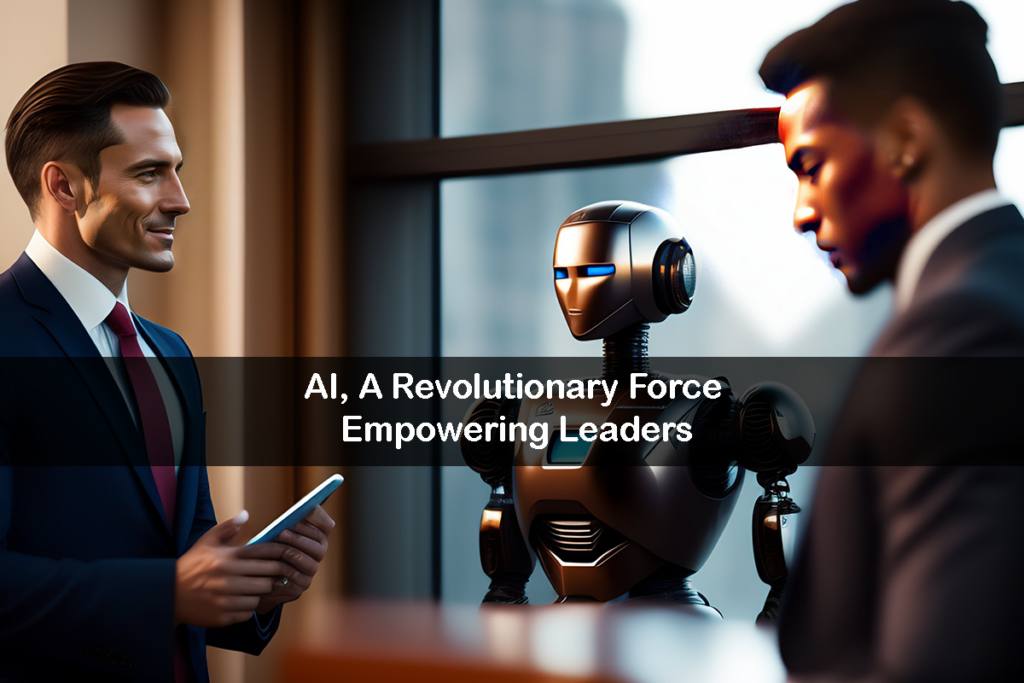Table of Contents
Introduction
In today’s rapidly evolving digital landscape, the advent of artificial intelligence (AI) has sparked intense debates about its potential implications for leaders across industries. While some view AI as a goldmine, others perceive it as a minefield, fraught with challenges and uncertainties. In this comprehensive article, we delve into the multifaceted nature of artificial intelligence, exploring its transformative power, benefits, and the strategic opportunities it presents to forward-thinking leaders. By examining real-world examples and cutting-edge applications, we aim to provide valuable insights and perspectives on AI’s role in driving organizational success.

The Rise of Artificial Intelligence
Artificial intelligence has emerged as a disruptive force, reshaping the way businesses operate and leaders make critical decisions. From machine learning algorithms to natural language processing, AI technologies enable organizations to process vast amounts of data, gain actionable insights, and streamline complex workflows. By automating mundane tasks and augmenting human capabilities, AI empowers leaders to focus on strategic initiatives, driving innovation and growth.
Unleashing the Potential: AI as a Goldmine
Enhanced Decision-Making
Leveraging AI-powered analytics and predictive modeling, leaders can make data-driven decisions with unprecedented accuracy and speed. The ability to extract valuable insights from massive datasets allows for better risk assessment, identifying market trends, and optimizing operational efficiencies.
Personalization and Customer Experience
With AI, leaders can deliver personalized experiences to customers at scale. By analyzing user behavior, preferences, and historical data, AI algorithms can tailor product recommendations, optimize pricing strategies, and provide proactive customer support. This level of personalization fosters customer loyalty increases satisfaction, and drives revenue growth.
Process Automation and Efficiency
AI-driven automation revolutionizes repetitive and time-consuming tasks, freeing up valuable resources and reducing operational costs. Leaders can deploy AI-powered chatbots for customer service, automate supply chain logistics, or enhance manufacturing processes through predictive maintenance. By streamlining operations, organizations can achieve greater efficiency and agility.
Innovation and Competitive Advantage
Embracing AI empowers leaders to unlock new avenues for innovation. Organizations can gain insights into market trends, customer preferences, and emerging technologies by leveraging machine learning algorithms. These insights help leaders develop forward-thinking strategies, create disruptive products, and maintain a competitive edge in rapidly evolving industries.

Navigating the Challenges: AI as a Minefield
While the potential benefits of AI are vast, leaders must also confront the challenges and risks associated with its implementation.
Ethical Considerations and Bias
As AI systems rely on vast datasets for training, biases within the data can lead to unintended consequences and perpetuate societal inequalities. Leaders must ensure responsible AI development, addressing bias, privacy concerns, and ethical implications to build trust with customers and stakeholders.
Workforce Displacement and Upskilling
The automation potential of AI raises concerns about job displacement. Leaders must proactively address this by implementing reskilling programs and fostering a culture of lifelong learning. By embracing AI as a tool to enhance human capabilities, leaders can create a harmonious synergy between technology and human talent.
Cybersecurity and Privacy
AI systems gather and process large amounts of sensitive data, making organizations susceptible to cyber threats. Leaders need to prioritize robust cybersecurity measures, implement data privacy protocols, and ensure compliance with regulatory frameworks to protect customer data and maintain trust.

Real-World Success Stories: Harnessing AI for Competitive Advantage
To illustrate the transformative power of AI, let’s explore a few real-world success stories:
Company X: Revolutionizing Customer Service
Company X, a leading e-commerce platform, implemented AI-powered chatbots to handle customer queries. By analyzing customer interactions and sentiment, the chatbots swiftly resolved issues and provided personalized recommendations. This led to a significant reduction in customer service costs, increased customer satisfaction, and improved conversion rates.
Organization Y: Enhancing Supply Chain Efficiency
Organization Y, a global logistics provider, leveraged AI algorithms to optimize its supply chain operations. By analyzing real-time data on inventory, demand patterns, and external factors, they streamlined distribution routes, minimized stockouts, and reduced transportation costs. This resulted in improved operational efficiency and faster order fulfillment.

FAQ: Artificial Intelligence and Leadership
1. What is the role of artificial intelligence in empowering leaders?
Artificial intelligence plays a crucial role in empowering leaders by providing them with data-driven insights, enhancing decision-making processes, automating tasks, and driving innovation and competitive advantage.
2. How does artificial intelligence enhance decision-making for leaders?
Artificial intelligence enhances decision-making by analyzing vast amounts of data, identifying patterns, and providing accurate predictions. It enables leaders to make informed decisions, mitigate risks, and capitalize on opportunities.
3. Can artificial intelligence improve customer experiences?
Yes, artificial intelligence can significantly improve customer experiences. By leveraging AI algorithms, leaders can personalize product recommendations, optimize pricing strategies, and provide proactive customer support, leading to increased satisfaction and loyalty.
4. What are some potential challenges of implementing artificial intelligence in leadership?
Challenges of implementing artificial intelligence in leadership include ethical considerations and bias, workforce displacement, cybersecurity and privacy concerns, and the need for upskilling employees to adapt to AI-driven environments.
5. How can leaders address ethical considerations and biases associated with artificial intelligence?
Leaders can address ethical considerations and biases by ensuring responsible AI development, actively managing biases within datasets, prioritizing diversity and inclusivity, and implementing transparent decision-making processes.
6. What measures should leaders take to mitigate workforce displacement due to AI adoption?
To mitigate workforce displacement, leaders should implement reskilling programs, invest in continuous learning initiatives, foster a culture of adaptability, and encourage employees to develop skills that complement AI technologies.
7. What steps can leaders take to protect data privacy and cybersecurity when implementing AI?
Leaders should prioritize robust cybersecurity measures, implement data privacy protocols, comply with regulatory frameworks, regularly update security systems, and educate employees about cybersecurity best practices to protect data and maintain customer trust.
8. Can you provide real-world examples of organizations leveraging AI for competitive advantage?
es, organizations like Company X and Organization Y have successfully leveraged AI. Company X implemented AI-powered chatbots for customer service, reducing costs and improving customer satisfaction. Organization Y used AI algorithms to optimize supply chain operations, leading to improved efficiency and faster order fulfillment.
9. How can leaders ensure responsible and sustainable AI adoption?
Leaders can ensure responsible and sustainable AI adoption by considering ethical implications, promoting transparency, establishing clear guidelines and policies, fostering collaboration between humans and AI systems, and engaging in ongoing monitoring and evaluation.
10. What are the prospects of artificial intelligence in leadership?
The prospects of artificial intelligence in leadership are vast. As AI technologies continue to advance, leaders can expect increased automation, enhanced predictive capabilities, improved natural language processing, and the integration of AI into various aspects of decision-making and organizational operations.

Conclusion
Artificial intelligence has the potential to be a game-changer for leaders, presenting both a goldmine of opportunities and a minefield of challenges. By harnessing AI’s transformative power, leaders can enhance decision-making, drive innovation, and create unparalleled customer experiences. However, navigating ethical considerations, addressing workforce displacement, and safeguarding data privacy are crucial for sustainable and responsible AI adoption. As the AI landscape evolves, leaders who embrace its potential and proactively mitigate its risks will be well-positioned to thrive in the digital age.

6 thoughts on “Artificial Intelligence: A Revolutionary Force Empowering Leaders”